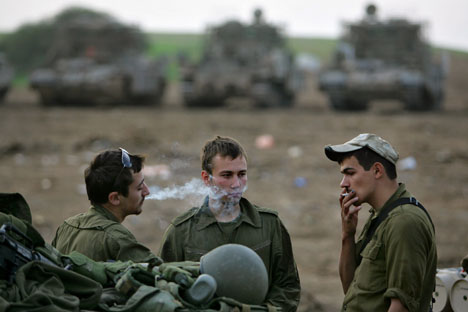Cease-fire interrupted by missiles

Israeli soldiers smoke at a military staging area near Kibbutz Mefalsim in southern Israel on the border with the Gaza Strip, Sunday, Nov. 26, 2006. A truce meant to end five months of deadly Israeli-Palestinian clashes took hold in the Gaza Strip early S Joseph Lamberson
Nov 27, 2006
Last updated on May 12, 2016 at 06:30 a.m.
GAZA CITY, Gaza Strip — Rocket fire from Gaza died down Sunday after a daybreak cease-fire, raising hopes for an end to five months of bloody destruction and a new opening toward peace talks.
The surprise truce was supposed to take effect at 6 a.m., but in the four hours that followed, 11 rockets were fired from Gaza at Israeli towns and villages and some Palestinian militants threatened to keep up the attacks.
Israel did not retaliate, saying it wanted to give the truce a chance.
“Even though there are still violations of the cease-fire by the Palestinian side, I have instructed our defense officials not to respond, to show restraint, and to give this cease-fire a chance to take full effect,” Prime Minister Ehud Olmert said during a ceremony at a high school in southern Israel.
Get The Daily Illini in your inbox!
Rivals Hamas and Fatah, the two main factions in the Palestinian government, also publicly backed the truce. Palestinian Prime Minister Ismail Haniyeh of the ruling Hamas movement said he had contacted the leaders of all Palestinian factions Sunday and they reassured him they were committed to the cease-fire.
Palestinian President Mahmoud Abbas of Fatah, who has been pressing for a reopening of peace talks with Israel, ordered his security forces to patrol the Gaza border on Sunday to stop rocket attacks. Security officers fanned out across northern Gaza, taking up positions at major intersections with orders to stop anyone suspicious and the salvos stopped by the afternoon.
“The instructions are clear. Anyone violating the national agreement will be considered to be breaking the law,” said Lt. Gen. Abdel Razek Mejaidie, Abbas’ security adviser.
Battle-hardened Israelis and Palestinians were wary, having seen similar truces and peace efforts disintegrate.
In the Gaza town of Beit Hanoun, the source of most of the rocket fire and target of punishing Israeli reprisals, Rafik Gaish was bitter because the Israelis tore up his fields.
“My potatoes were apparently launching rockets,” the farmer scoffed. “We are for this agreement, we want peace – but what will stop the Jews?”
Many residents of Beit Hanoun returning to their damaged homes after the Israeli withdrawal lashed out in anger.
“The Israelis need no pretext to cause destruction, for killing and bloodshed,” said Ayoub Kafarna, 65. “Nothing can compensate us for our losses.”
Just 1 1/2 miles away, many of the 22,000 residents of the working-class Israeli town of Sderot, targeted by hundreds of rockets from Gaza, were pessimistic.
“I was optimistic, but that optimism lasted only a few minutes until another rocket landed,” 20-year-old Neta Ammar said Sunday.
“It’s a joke,” said Dudu Cohen, a 37-year-old convenience store owner in Sderot. “There is no one to talk to on the other side, there is no one to have a cease-fire with.”
If the truce holds, it would be a coup for Abbas who has been trying for months to end the violence in Gaza that has killed 300 Palestinians, scores of them civilians, and five Israelis.
Israeli Foreign Minister Tzipi Livni stressed the need to follow the truce with diplomatic steps.
“History teaches us that if this kind of cease-fire with the Palestinians isn’t accompanied by something else, it will deteriorate,” she said.
The cease-fire was worked out late Saturday night when Abbas called Olmert with an agreement to halt rocket fire.





